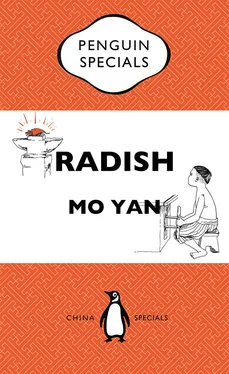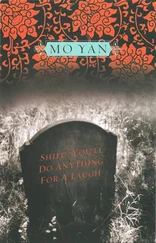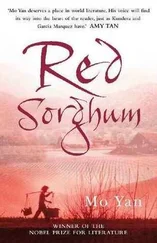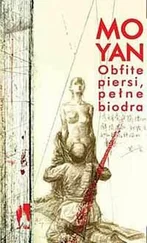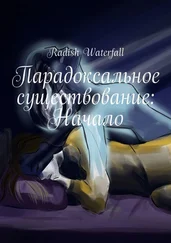‘Hei-hai! Hei-hai!’ The mason was calling him from the bridge opening. ‘You’ll drown out there, Hei-hai.’
He heard the blacksmith come up to the riverbank, but didn’t turn to look. All the man could see was the boy’s green back.
‘Come out of there!’ the blacksmith said, picking up a dirt clod and throwing it; it sailed over Hei-hai’s head, brushing the tips of his hair before falling into the water to create oval ripples. A second clod hit him in the back. He fell forward, his lips touching the water. He spun around and, huffing and wheezing, waded fitfully toward the river’s edge. He stood in front of the blacksmith, dripping wet. His shorts stuck to his skin, his little pecker sticking up like a silkworm chrysalis. The blacksmith raised his bear-like paw to slap him, but suddenly felt as if a cat’s claw had scored his heart. The boy’s eyes never left his face.
‘Go stoke the fire. My chisels are as good as the old guy’s,’ he said proudly, patting Hei-hai on the nape of his neck.
During an idle moment at the forge, the blacksmith put the sweet potatoes from the night before into the forge to bake. A light wind blew in from the jute fields. Sunlight shone straight into the arched openings. The blacksmith singing as he turned the sticky potatoes over with his tongs.
From Beijing to Nanjing, I’ve never seen anyone string up an electric light in their pants.
‘Have you ever seen that, Hei-hai? How about your adopted mother’s pants?’ That reminded him. ‘Run over and pick some radishes,’ he said. ‘When you bring them back, I’ll give you a couple of potatoes.’
Hei-hai’s eyes lit up, and the blacksmith saw his heart leap in the space between his ribs. The boy took off like a jackrabbit before the man could say another word. As he clambered up the levee, Hei-hai heard Juzi call his name in the distance. He turned to look, but was blinded by the sun. He ran down the other side and into the jute field. The plants were scattered across the field, no columns or rows. Where more seeds had landed, the stalks were thin, like fingers or pencils; where there were fewer plants, they were as thick as sickle handles or arms. But they were all the same height. Looking out from atop the levee, it was like gazing at a gently rippling lake. Now he parted the plants as he moved, suffering the onslaught of thorns and sending mature leaves to the ground. Quickly arriving at a spot parallel to the radish field, he turned and headed west. When he neared the field, he fell to his hands and knees and began to crawl; in no time, he spotted dark green radish tassels. Sunlight shone through the tassels upon an expanse of red radish tops. He was about to emerge from the jute field when he quietly shrank back after seeing an old man crawling along a ridge in the radish field, taking wheat seeds from a sack and planting them one at a time in the furrows between the ridges. The autumn sun proudly shone down on his back. A light wind stirred up dust that landed on his sweat-soaked white jacket and turned it brown along the wet spots. Hei-hai crawled backwards a few metres and flattened out, resting his chin in his hands so he could see the radishes through the jute stalks. Great numbers of red eyes looked back at him from the field, and the tassels were transformed into black hair that fluttered like bird feathers.
A red-faced young man strode over from the sweet potato patch and stopped behind the old man. ‘Hey!’ he said abruptly. ‘Did you say we had a thief last night, old man?’
The old man scrambled to his feet and stood with his hands at his sides. ‘Yes,’ he said, ‘he stole six radishes and left the tassels behind, plus eight sweet potatoes, but he didn’t take the vines.’
‘Probably one of those assholes working on the floodgate. Keep an eye out. Wait a while before coming in for lunch.’
‘That’s what I’ll do, brigade commander,’ the old man said.
Hei-hai and the old man watched the red-faced man climb the levee. The old man sat down in the radish field, directly facing a panicky Hei-hai, who backed up some more. Now the dense jute plants blocked his view.
‘Hei-hai!’
‘Hei-hai!’
Juzi and the mason were on the crest of the levee calling to him in the jute field. The sun was behind them, shining on workers leaving the site.
‘I saw him slip into the jute,’ she said. ‘I think he went in to piss.’
‘I wonder if the one-eyed ogre was abusing him again,’ he said.
‘Hei-hai!’
‘Hei-hai!’
Two voices, one female, the other male, swept over the tips of jute plants like gliding swallows; the house swallows skimming after grey moths flew off in fright, and did not land for a long while. The blacksmith stood in front of the bridge opening, his good eye on the man and woman standing shoulder to shoulder; he felt his stomach begin to swell. Moments earlier, when the woman and the mason had come looking for Hei-hai, the way they talked and acted, a stranger would have thought they were looking for their own child. ‘Just wait,’ he fumed under his breath, ‘you damned lowlifes!’
‘Hei-hai! Hei-hai!’ Juzi called out. ‘He probably crawled into the jute field and fell asleep.’
‘We should go look for him, don’t you think?’
‘I don’t know, should we? Yes, let’s do.’
They walked hand in hand into the jute field. The blacksmith ran up the levee and watched the wave-like motion of jute leaves as the stalks rustled, hearing one male and one female voice calling out ‘Hei-hai’, the sound seeming to come from underwater.
Tired of crawling, Hei-hai sighed and rolled over, looking up at the sun. He lay on a bed of dry sand, thinly covered with jute leaves, pillowing his head on his hands, his belly seeming to cave in; a yellow leaf with red spots floated down and covered the coal dust in his navel. He looked up at the sky and saw blue sunbeams of varying widths filtering down through the leafy canopy. The jute leaves were like a flock of golden sparrows in an aerial dance. At other times the golden sparrows seemed like moths, the spots on their wings dancing happily, like the brown film over the young blacksmith’s eye.
‘Hei-hai!’
‘Hei-hai!’
The familiar sounds brought him out of his dream state. He sat up and bumped a thick jute stalk with his arm.
‘That boy, he must be asleep.’
‘I don’t think so, not the way we’ve been calling him. He probably slipped away home.’
‘The little imp…’
‘It’s really nice here…’
‘Yes, it is…’
Their voices grew softer, like fish blowing bubbles on the surface. Hei-hai felt a faint electrical current pass through him and became nervous. Up on his knees, he shifted his ears and adjusted his sight until his gaze slipped past all obstructions and he saw his friends, their bodies split and sectioned by the jute stalks. A breeze set the leaves of stilled jute plants in motion, but not the stalks. A few more leaves fell to the ground, and Hei-hai heard them stir the air. He was surprised and puzzled to see a crimson bandana float down onto the jute plants, where it was caught on thorns, a silent banner. Then the red checked jacket was on the ground. The jute plants rushed toward him like surging waves. Slowly he got to his feet, turned his back, and started walking, a strange feeling crashing over him.
Juzi and the mason appeared to forget about Hei-hai over the next couple of weeks, and even stopped going to the bridge to see him. At noon and night, he heard meadowlark songs in the jute field, which always brought a cold grin to his face, as if he knew what the bird was saying. The blacksmith did not notice the meadowlark’s call until several days after Hei-hai. From his place under the bridge he discovered the woman and the mason’s secret by careful observation. Whenever the meadowlark call sounded, the mason was absent from the worksite. The young woman, beset with anxiety, would look around before laying down her hammer and walking off. Not long after she left, the meadowlark stopped singing. Then an awful look would disfigure the blacksmith’s face, and he would be spoiling for a fight. He began drinking. Hei-hai bought him a bottle of potato spirits every day from the little shop across the bridge.
Читать дальше
